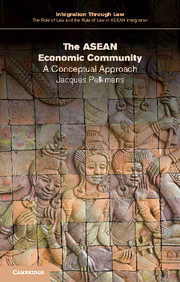Book contents
- Frontmatter
- Contents
- List of figures
- List of tables
- List of boxes
- General editors’ preface
- 1 Introduction and purpose
- 2 Foundations of economic integration fundamentals, stages and credibility
- 3 Conceptual foundation of the ASEAN Economic Community
- 4 Implementation of the AEC: progress in adopting instruments from the Roadmap
- 5 A reality check: comparing the AEC and NAFTA on substance
- 6 Options for the AEC and their practical implications
- 7 Conclusions
- Executive summary
- Appendix 1
- References
- Index
2 - Foundations of economic integration fundamentals, stages and credibility
Published online by Cambridge University Press: 05 March 2016
- Frontmatter
- Contents
- List of figures
- List of tables
- List of boxes
- General editors’ preface
- 1 Introduction and purpose
- 2 Foundations of economic integration fundamentals, stages and credibility
- 3 Conceptual foundation of the ASEAN Economic Community
- 4 Implementation of the AEC: progress in adopting instruments from the Roadmap
- 5 A reality check: comparing the AEC and NAFTA on substance
- 6 Options for the AEC and their practical implications
- 7 Conclusions
- Executive summary
- Appendix 1
- References
- Index
Summary
In attempting to understand the AEC and grasp its full potential as well as its limitations, it is indispensable to first go through a careful identification of the foundations of its possible economic integration model. We shall do this by: (a) articulating the fundamentals of any economic integration and discussing their relevance to the AEC; (b) linking the (modern) stages approach to economic integration to the AEC ‘vision’; and (c) addressing the intricate, yet critical, issue of credibility and transparency to market players.
Fundamentals of economic integration and the AEC
When (regional) ‘economic integration’ is intended to move significantly beyond, say, a classical FTA in goods, it becomes more and more crucial to first appreciate several fundamentals. A non-exhaustive list of such fundamentals includes: (i) the political framework; (ii) the long-term commitment of the participating countries, expressed in credible treaties or otherwise; (iii) the level of development and/or the disparities in prosperity and capabilities; (iv) the ‘economic order’, in particular, the respect for market-driven incentives; and (v) some form of implicit or explicit consensus on the comprehensiveness or selectivity of economic integration.
The political framework
For ‘deeper’ economic integration to be meaningful, governments and political leaders have to assume a long-term perspective. They have to be seen as willing to accept, at least to a non-trivial degree, the domestic consequences of ‘deeper’ integration. A failure to do so will not only leave major gaps or omissions in what that Member State is committing to, but will reduce, at the same time, the preparedness of partners to further the process. It will equally damage credibility with market players, who have to exploit the promised opportunities and generate the prosperity gains sought. Of course, socio-economic and political sensitivities are a reality almost everywhere in the world, and various formulae can and will be employed to cope with such problems. One may mention agreed exceptions, exemptions and delays, though all of these run into their natural limits – otherwise the economic integration pursued will simply not emerge. One may allow the ASEAN-X formula, or (what Europeans call) ‘géométrie variable’ or differentiated integration, but these cannot be pushed too far and will eventually have to be addressed, if not overcome, to a considerable extent.
- Type
- Chapter
- Information
- The ASEAN Economic CommunityA Conceptual Approach, pp. 8 - 74Publisher: Cambridge University PressPrint publication year: 2016



